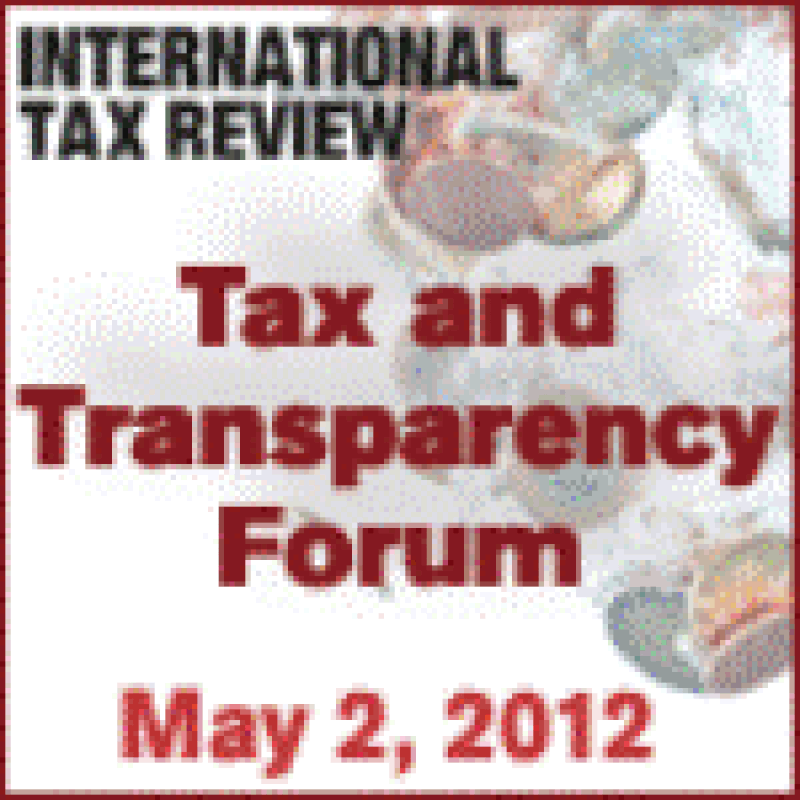
On the one hand, the ALP provides the closest scenario to genuine market conditions for taxpayers but it is highly complex. With formulary apportionment – the most acceptable alternative to the ALP - it would mean less paperwork for taxpayers but the uniform treatment of valuation principles would require documentation for different countries.
Speakers at the International Tax Review’s Tax and Transparency Forum, in London’s Grand Connaught Rooms on May 2, will discuss the alternatives to the ALP, including the potential for country-by-country reporting to see whether ALP is still the most suitable regulator for transfer pricing.
While taxpayers are attracted to the higher levels of certainty attached to ALP, tax campaigners feel that formulary apportionment and country-by-country reporting will provide fairer tax revenues for countries.
Speakers include: Joseph Andrus, head of the Transfer Pricing Unit at the OECD; Martin Hearson, policy adviser for ActionAid; Bao Ho, director at TP Analytics; Richard Brooks a journalist at Private Eye; and Colin Garwood, head of group tax for Intercontinental Hotels UK.
Ho will open the session with a question to gauge the audience’s point of view on the ALP, which is likely to lead onto the issue of bargaining power.
“I would like to start with a question on whether the audience is dissatisfied with the ALP because it leads to gross mispricing or because they do not like the outcome of arm's-length pricing,” said Ho. “Based on my understanding of materials by Tax Research and ActionAid, I sense the latter. If this is the case, we need to focus the discussion on bargaining power and its impact on arm's-length pricing.”
Ho acknowledges the debates in the media between the OECD and tax campaigners about formulary apportionment and wants to add her opinions to the mix: “I would like to add my two cents to the discussion, focusing on the costs and benefits of increased disclosure based on my practical experience.”
ActionAid has a focused agenda for the debate and will look at the lessons from its SABMiller report about the difficulties faced by developing countries dealing with transfer pricing; the role of international standard-setting in addressing this and the contributions of different institutions; and the responsibilities of the home states of MNCs.
“The most controversial issue to discuss is likely to be the role of the OECD as a transfer pricing standard-setter,” said Hearson. “After India's broadside last month there's a clear division opening-up between developing and developed countries. We hope this will lead to a productive debate about the appropriate institutional arrangements for international tax. But, most businesses and OECD countries, not to mention the OECD secretariat, have so far been unwilling to enter into that debate beyond a reflex defence of the OECD's status as the pre-eminent standard-setter.”
However, Andrus is not planning on entering into a controversial discussion: “Improving the transfer pricing system is an ongoing process and business, governments of developed and developing countries, NGOs, the OECD, the UN, and transfer pricing practitioners should all have that as an objective.”
During the discussion Andrus will review the efforts the OECD is making with regard to transfer pricing simplification and the potential application of those efforts in developing countries. He will also talk about ongoing OECD capacity building efforts and the work we are doing on intangibles.
“I will emphasise the importance for all countries, developing and developed, in having a consistent global approach to transfer pricing issues and will likely suggest that those who have considered formulary apportionment, including most recently statements from the UN, all seem to reach the conclusion that it is an impractical solution for developing countries.”
Garwood is committed to questioning the controversy linked to ALP, however.
“I would hope that delegates would take away that there are good reasons why the ALP has general international agreement as the appropriate fundamental principle to follow when allocating taxing rights between jurisdictions,” said Garwood. “I am hoping to find out why that should be a matter of controversy, but also engage in a constructive discussion concerning some of the difficulties encountered in applying it in developing countries.”
A balanced view-point is an important take-away for delegates attending this session considering the misinterpretation of transfer pricing in main-stream media.
“I hope the delegates will take away a balanced view of the ALP and formulary apportionment,” added Ho. “A huge concern in the transfer pricing community is the way the media and non-practitioners have sensationalise the topic of transfer pricing without due consideration to the technical aspects. I see general news articles highlighting the negligence of one multinational or another for not paying more taxes in a particular country without adequate consideration to the economic drivers of such an outcome.”
The Forum is free to attend for tax directors and NGOs. For a full programme and details of how to register, click here.









